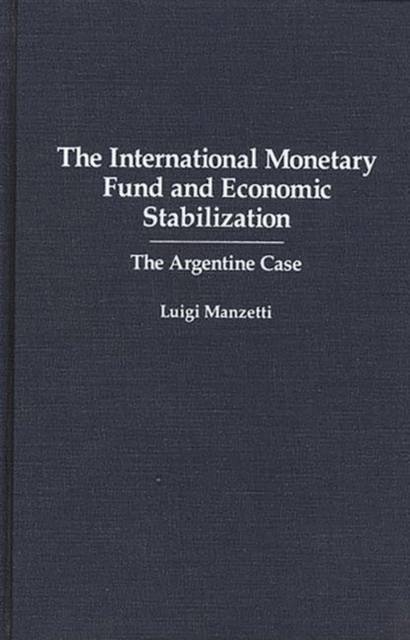
- Retrait gratuit dans votre magasin Club
- 7.000.000 titres dans notre catalogue
- Payer en toute sécurité
- Toujours un magasin près de chez vous
- Retrait gratuit dans votre magasin Club
- 7.000.0000 titres dans notre catalogue
- Payer en toute sécurité
- Toujours un magasin près de chez vous
Description
In 1958, 1976, and 1985, Argentina experienced severe imbalances of its external accounts, which led to attempts at economic stabilization through an agreement with the International Monetary Fund. This book examines these IMF-supported programs and their success in alleviating Argentina's economic problems. Luigi Manzetti explores three aspects of the issue: the programs' impact on the Argentine economy from a policy management perspective; the methods by which different political regimes coped with similar problems and the level of their success; and the relationship between economic stabilization and political institutions, with particular emphasis on why IMF-supported programs encounter problems and how these problems can be overcome.
Exploring the previously overlooked relationship between economic and public policies, Manzetti begins his study by examining the balance of payments problems that afflict developing countries along with the role played by the IMF in solving them. He assesses IMF involvement both in terms of economic theory and policy recommendations, portraying the academic debate that for years has surrounded the IMF. The peculiarities of the Argentine case are outlined, as are contending interpretations of the country's chronic economic crises. A set of three chapters fully details the stabilization plans of the Frondizi, Videla, and Alfonsin administrations. Finally, a concluding chapter argues that wrong assumptions by the IMF and the mistakes of Argentina's policy makers were responsible for the limited success of the programs. This work will be an important reference tool for courses in economic development and Latin American studies, as well as a useful resource for academic and professional libraries.Spécifications
Parties prenantes
- Auteur(s) :
- Editeur:
Contenu
- Nombre de pages :
- 256
- Langue:
- Anglais
- Collection :
Caractéristiques
- EAN:
- 9780275933975
- Date de parution :
- 18-07-91
- Format:
- Livre relié
- Format numérique:
- Genaaid
- Dimensions :
- 156 mm x 247 mm
- Poids :
- 548 g

Les avis
Nous publions uniquement les avis qui respectent les conditions requises. Consultez nos conditions pour les avis.






